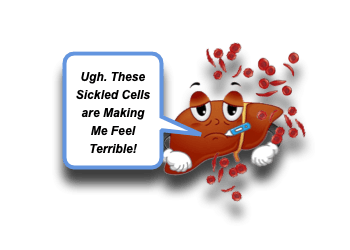Sickle Cell Hepatopathy

Sickle Cell Disease (SCD) is terrible, and we are well versed in many of the common presentations. Pain and fever complaints dominate the majority of the encounters in the ED; however, let us not overlook the potential impact SCD has on all organ systems: leading to a wide variety of complications from Priapism to Acute Chest Syndrome and to Splenic Sequestration. Even Sickle Cell Trait can lead to complications! This week, I had the pleasure of being at the ACEP/AAP Advanced Ped EM Assembly (make sure to consider joining us next March in New York) where Dr. Ilene Claudius reminded me of another important set of complications caused by SCD. Let’s take a moment to review this potentially life-threatening complication of SCD – Sickle Cell Hepatopathy:
Sickle Cell Hepatobiliary Complications
- Hepatobiliary system is one of the most common intra-abdominal organsadversely affected by SCD. [Shah, 2017]
- Evident in 10-40%of sickle cell crisis cases.
- Basic pathophysiology components: [Shah, 2017]
- Increased RBC destruction leads to increased bilirubin processing.
- Intrahepatic sickling of RBCs leads to sinusoidal obstruction.
- Microvascular obstruction and stasis and local hypoxia lead to acute and chronic problems.
- Each Hepatobiliary Complication can generate a wide spectrum of presentations, from mild and transient to fulminant and life-threatening. [Shah, 2017]
- Individual Hepatobiliary Complications can be difficult to classifyas there can be substantial overlap between conditions. [Pecker, 2018;Shah, 2017]
Sickle Cell Hepatobiliary Complications: Chronic [Shah, 2017]
- Iron Overload
- Consequence of accumulation of transfused iron, continued hemolysis, and increased GI absorption.
- Can be asymptomatic or lead to cirrhosis.
- Gallstone Disease [Simon, 2016]
- Common in patients with SCD (~25-58% in patients 10 years to 65 years of age)
- Cholecystectomy is the most common surgical procedure in patients with SCD.
- Viral Hepatitis
- SCD patients have higher prevalence of viral hepatitis.
- Can present similarly to other patients with viral hepatitis but can also exacerbate one of the other complications.
- Sickle Cell Cholangiopathy
- Due to ischemic injury to the biliary (ischemic cholangiopathy).
- Leads to obstructive jaundice, itching, and cholestatic LFTs.
Sickle Cell Hepatobiliary Complications: Acute [Pecker 2018;Shah, 2017]
- “Sickle Cell Hepatopathy” [Pecker, 2018;Shah, 2017]
- Term referring to liver dysfunction and hyperbilirubinemia due to intrahepatic sickling process.
- Leads to local ischemia, sequestration, and cholestasis.
- Chronic liver disease may confound acute changes, so judge current lab results against prior ones if available. [Simon, 2016]
- Also associated with Sepsis, Viral Hepatitis, Autoimmune Disease, and Iron Overload. [Pecker, 2018]
- Degree of sickling and severity of obstruction produce spectrum of acute injurythat includes:
- Acute Sickle Cell Hepatic Crisis[Shah, 2017; Simon, 2016]
- Seen in ~10 %of patients presenting with vaso-occlusive crisis.
- May present like acute cholecystitis (fever, RUQ pain), but has concurrent hepatomegaly.
- ALT/AST range from normal to 3 x normal levels.
- Elevated bilirubin (mostly conjugated) but < 15 mg/dL.
- Tx: Supportive care with hydration and treatment of vaso-occlusive crisis.
- Acute Hepatic Sequestration[Shah, 2017]
- Large amount of RBC entrapped in liver.
- Massive dilation of sinusoids compressing the biliary tree.
- Abrupt onset of severe RUQ pain, rapid increase in liver size, acute worsening anemia.
- May present with overt shockdue to acute fall in hematocrit.
- Significant hyperbilirubinemia(up to 24 mg/dL).
- Alkaline phosphatase can rise up to 650 IU/L. ALT/AST are usually normal.
- Tx:
- Supportive care and resuscitation.
- Transfusion vs Exchange Transfusion (being careful to not cause Hyperviscosity Syndrome once liver releases trapped RBCs)
- Acute Intrahepatic Cholestasis[Shah, 2017; Simon, 2016]
- May be fatal! Fortunately, rare.
- Wide-spread ischemia.
- Severe acute hepatic crisisthat can progress to multi-organ failure.
- Acute liver failure
- Renal failure
- Encephalopathy
- Coagulopathy
- Severely elevated bilirubin (mostly conjugated)up to 200’s mg/dL.
- ALT/AST elevated > 1000 mg/dL.
- Alkaline phosphatase can be normal or elevated (>1000 IU/L).
- Tx:
- Supportive care (like antibiotics!)and resuscitation! [Pecker, 2018]
- Exchange transfusion
- Correction of coagulopathywith FFP.
- Dialysis for renal impairment.
- May require liver transplantation. [Pecker, 2018]
- Acute Sickle Cell Hepatic Crisis[Shah, 2017; Simon, 2016]
Moral of the Morsel
- Sickle Cell Disease SUCKS! Constant ischemia and infarcts not only cause pain but complicate the function of all of the organs.
- Fever and RUQ isn’t always Cholecystitis?Make sure you keep Sickle Cell Hepatopathy on your list of considerations!
- Don’t Make them Thick! Transfusion of RBCs in a patient with SCD should always be done carefully and with consideration of possibly causing Hyperviscosity Syndrome. Consult your friendly pediatric hematologist!
- Don’t forget the bug juice!The febrile sickle cell patient still needs us to consider bacterial infection high on their problem list!

